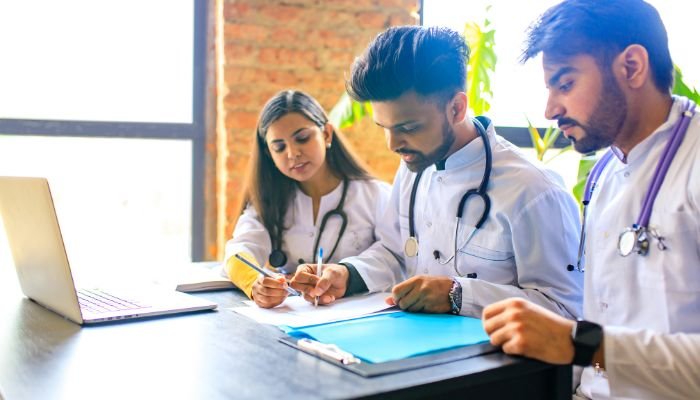KIITS Pharmacy College in Dehradun

Ever wanted to know what its like being in pharmacy student shoes? The journey of a pharmacy student is a multifaceted one, running the full spectrum from early-morning lectures to late-night study sessions somewhat reminiscent of friendship (tv show about underemployed thirty somethings living in the big city). Let’s have a look at whats happening in the lives of pharmacy students at KIITS Pharmacy College Dehradun on daily basis.
Morning Routine

The pharmacy (B.pharma and D.pharma) students of KIITS have to get up early in the morning. Students move into lecture rooms for lectures, as the rays of sun come up over a peaceful university campus. Every workshop — from pharmacology to medicinal chemistry — provides detailed scientific learning that is paramount for the students of tomorrow!
Hands-on Learning

Next are laboratory practicals after classes. Students here can get their hands dirty with labs, working on compounding medications, case studies regarding drug interactions, and even pharmaceutical research. With experienced Faculty members by their side, students are offered great hands on training to deal with real-world problems faced in Pharmacy practice.
Lunch Break
Between the rushing and running, pharmacy students get a chance to take 30 minutes or so for themselves. Lunchtime — whether spent on a meal with friends in the campus cafeteria, or getting a quick bite in between classes — is also an opportunity to relax and socialize among your peers.
Clinical Rotations
In the afternoons, pharmacy students enter into clinical rotations and start training in hospitals, clinics, community pharmacies. They work here, with medical professionals, learning to take care of patients and how to counsel on medications and administer their own health services. Clinical rotations offer a sneak peek into the many faces of pharmacy practice through medication reconciliations and patient rounds, oh my!
Study Sessions at KIITS Pharmacy College in Dehradun
After work begins to wrap up for the day, pharmacy students end up retreating back to the library. Armed with text books, journals and research papers they dive into detail involving pharmacotherapy, pharmacokinetics and pharmaceutical care. Studying – whether exam preparation, assignment writing or literature review— is ingrained in the life of every student of KIITS Pharmacy College in Dehradun.
Extracurricular Activities
Beyond academics, pharmacy students at KIITS participate in a myriad of extracurricular activities. From student-led clubs and organizations to community service initiatives and professional development workshops, there are endless opportunities for students to explore their interests, hone their skills, and make meaningful contributions to society.
Reflection and Rest
We paused to celebrate the hard work and dedication of our future pharmacists. Every day is a new canvas, celebrating success and learning from challenges has been the everyday at work. A day left satisfied…. As we slowly begin to make our way into compassionate and competent pharmacists, they take away their hearts filled and minds enriched in the journey.
Unique Challenges and Rewards
Pharmacy College in Dehradun — KIITS, amidst the glamorous horn of pharmacy success a two-wheeler driving pharmacy student forges through we enter in this world and it is full of sorrows that cries come straight from hearts even imaginations are made. Balancing school workloads, projects, and extracurricular activities can be difficult to do so in a way that requires a lot of time management and organization. Furthermore, since pharmacy is always evolving (new drugs, new treatments and new laws), as a result having to learn more while on the job.
However, converging with these are multitude gains and massive opportunities for learning both personally and professionally. Pharmacists and pharmacy students, as this article points out quite well in fact, do many good things to make the lives of patients better by providing important healthcare services that improve our quality of life.
Not only this, but the comradeship and support within the pharmacy community create a belongingness and cooperation. Study groups, mentorship programs and peers as well as faculty encourage students to take advantage of one another. The way any pharmacy student’s journey is never the final pursuit of knowledge but an interminable continuance to establish enduring bond, share experiences with one another and motivate others, I hope you find motivation in these dispensary as to rise up above to improve.
As pharmacy students at KIITS Pharmacy College in Dehradun, you are part of a dynamic group of committed to innovation and excellence in education and service. KIIT offers an environment that nurtures, encourages and leads students to recognize their potential with top-notch infrastructure facilities along with qualified faculty members providing value based holistic education.
In conclusion, the life of a pharmacy student at KIITS Pharmacy College in Dehradun is a vibrant tapestry of learning, exploration, and service. From classrooms to laboratories, from hospitals to communities, students embrace each day with passion, dedication, and a commitment to excellence. As they continue to navigate the path ahead, they carry with them the knowledge, skills, and values instilled by their alma mater, shaping the future of pharmacy with every step they take.








